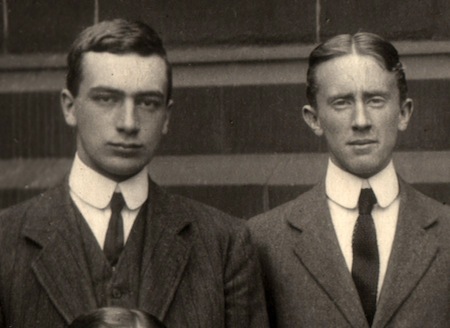Robert Quilter Gilson was at King Edward's School, Birmingham with J.R.R. Tolkien, part of his close-knit group of friends who called themselves the T.C.B.S. While Tolkien went to Oxford, Gilson went to Trinity College, Cambridge in 1912 to read classics. When Britain entered The Great War in 1914, Gilson entered the Cambridge University Officer's Training Corps, and was shipped out to France with the Cambridgeshires in 1915. A reluctant but beloved officer, Gilson was also a prolific letter writer, to his school friends, his family and his sweetheart, Estelle King, and wrote nearly daily from the trenches. Gilson was killed by a shell while leading his men over the top on the first day of the Battle of the Somme, 1st July, 1916. Friend and fellow officer Andrew Wright wrote to Gilson's father, "It was the final but not the first triumph over his sensitive nature - He alone is brave who goes to face everything with a full knowledge of [his own] cowardice." (Excerpted in Garth, Tolkien and the Great War.)
 |
| R.Q. Gilson (left) with J.R.R. Tolkien in 1910 or 1911 (image from www.johngarth.co.uk) |
Today, as part of my research, I looked Gilson up in the college Admissions Book, mostly to find the name of his tutor, as I already had a fair amount of information about him from other sources. After silently cursing my predecessors for not having students fill in their details alphabetically by surname as I do at the beginning of each Michaelmas Term, I found his entry and was surprised by the emotion I felt on seeing Gilson's details in his own handwriting, his curling script leaning slightly to the left in that upright early 20th century hand. It was as if after the time spent chasing after scraps of evidence of his existence, I turned a corner to meet him face to face. I thought about all the young men and women who I see signing the latest incarnation of the Admissions Book each year and imagined Gilson (I admit, I call him Rob in my head) in the same situation, brimming with possibility and purpose, but in this case I know what lays in store for him, unguessed by any of his peers. He has four years left after writing his details in the regimented columns of this book.
Four years.
Most of what I know of him comes from John Garth's biography of Tolkien, but I have the impression of a generous friend, a kind, caring, eloquent young man with a talent for drawing and painting. He got so little chance to leave his mark, but he left one just the same. I've reached 1914 in the Cambridge Review searching for Rob's name, and behind the articles about donations of books for the Field Hospital in Nevile's Court, Trinity, a Royal visit to the Leys School and sudden anti-German sentiments there are the statistics, the falling undergraduate numbers and the growing lists of names. And each of those names was another Rob Gilson - perhaps not as eloquent or artistic, perhaps not so fiercely beloved - but a young man full of potential.
.jpg) |
| Lieutenant R.Q. Gilson of the 11th Battalion Suffolk Regiment (known as "the Cambridgeshires" - image from http://www.curme.co.uk/p.htm) |
One has indeed personally to come under the shadow of war to feel fully its oppression; but as the years go by it seems now often forgotten that to be caught in youth by 1914 was no less hideous an experience than to be involved in 1939 and the following years. By 1918, all but one of my close friends were dead.
— J.R.R. Tolkien, forward to The Lord of the Rings